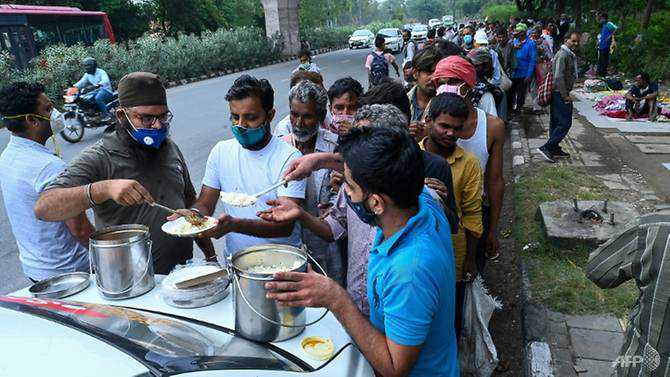Food cravings stalks India's poor in COVID-19 pandemic double blow
30 May, 2021

Rasheeda Jaleel lives in dread that she might not have the ability to feed her seven kids as an incredible number of Indian family members are forced into poverty by a devastating new coronavirus wave.
The 40-year-old, her hubby Abdul Jaleel, 65, and the children already survive on just one meal a day.
"When we happen to be hungry and thirsty, I feel incredibly helpless and be anxious, 'How am I likely to survive like this?'" Jaleel told AFP as she produced roti (flatbread) for the solitary food within their tiny New Delhi flat.
"We manage with whatever my hubby has the capacity to earn. If it's insufficient, I stay hungry so I can feed my children."
The coronavirus has killed 160,000 in eight weeks, overwhelmed hospitals and shut various businesses in India. Industry experts warn that another crisis is definitely looming, with rising levels of food cravings among poor Indians currently reeling from a first lockdown last year.
"It's a double crisis that the indegent in the country are facing - there may be the wellbeing crisis and there is also an income economic crisis," Anjali Bhardwaj from the proper to Food Plan told AFP.
"We have had a huge health crisis unfolding ... and several have had to invest their life savings on trying to provide medical aid with their families."
About 230 million Indians fell into poverty - defined as living on significantly less than 375 rupees (US$5) each day - in the first year of the pandemic, according to a report by Bangalore's Azim Premji University.
"WE'VE NO CHOICE"
A lot more than 7.3 million jobs were dropped in April alone, in line with the Center for Monitoring the Indian Overall economy. That means more soreness in a nation where 90 % of the workforce is usually in the informal sector without social back-up, and where millions usually do not be eligible for emergency government rations.
"A lot of individuals went into poverty last year, they went into debts, and... they had to lessen on food intake," Associate Professor Amit Basole, one of the university study's authors, advised AFP.
"Therefore the second wave is definitely coming together with an extremely precarious, stressed situation."
Abdul Jaleel considered peddling a rickshaw to feed his family just after his construction work dried up during a fresh Delhi lockdown.
Previously up to 500 rupees (US$7) a day, his income is now less than 100 rupees.
"And on some times, I don't make anything," he said.
"As father and mother, we will need to make ends meet somehow, whether we beg, borrow or steal. We've no choice."
"HELPLESS AND HUNGRY"
In last year's lockdown, about 100 million persons lost their careers in India. After constraints were lifted, around 15 per cent failed to find employment by the end of 2020 - including 47 % of female employees, the Azim Premji University research found.
Many who returned to do the job had to settle for lower give, leaving them even more vulnerable when the second wave hit.
Meanwhile, an estimated 100 million Indians like the Jaleels haven't any ration cards to provide them access to government food help, Bhardwaj said.
The Right to Foodstuff organisation has been campaigning for emergency foodstuff supplies to get to the needy, regardless if they do not have ration cards.
With the pandemic unravelling years of poverty decrease, experts warn that lots of could continue to be trapped in a vicious cycle of hardship even after lockdowns are lifted.
"The dread is that we ... get locked right into a longish-term depressed market where there can be low aggregate demand because people's careers and incomes aren't coming back again. And because they are not coming back, it ... perpetuates its cycle," Basole said.
Bhupinder Singh, a micro-financier who has distributed foodstuff to the needy through the two lockdowns, has seen desperation rise among a huge selection of unemployed men sleeping tough beside a busy Delhi highway.
When he arrives with meals packets, a cry of excitement rises and men run to the back of his car and form a long queue.
"Folks are stuck here out of helplessness," Sunil Thakur, 50, who dropped his job as a hotel waiter through the lockdown, told AFP.
"If they come with food, we get to eat ... If they don't arrive, we'll stay hungry."
Source:
